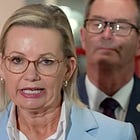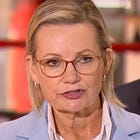Coalition, Labor Clash Over Immigration as Burke Warns Against 'Securitising' Debate
This piece is freely available to read. Become a paid subscriber today and help keep Mencari News financially afloat so that we can continue to pay our writers for their insight and expertise.
Today’s Article is brought to you by Empower your podcasting vision with a suite of creative solutions at your fingertips.

Home Affairs Minister Tony Burke challenged the opposition Thursday to specify which visa categories it would cut to reduce immigration, accusing Shadow Home Affairs Minister Jono Duniam of advocating reductions without identifying affected sectors including healthcare, construction, or education workers.
Australia’s immigration debate intensified Thursday as the government and opposition staked out sharply contrasting positions on migration levels, refugee resettlement, and the intersection of national security with multicultural policy, exposing deep partisan divisions over one of the nation’s most politically sensitive issues.
In a combative National Press Club address, Home Affairs Minister Tony Burke directly challenged the Coalition’s pledge to reduce immigration numbers beyond the government’s already-achieved 40 percent reduction in net overseas migration, demanding opposition figures specify which visa categories would face cuts.
“If the opposition want to say they need to get net overseas migration down faster than the 40% drop that the government’s already done, there needs to be a discussion not simply about what’s the total, but what’s the visa class?” Burke said. “You need to work out if you want to argue we need to go harder than what the government’s doing to answer the question where.”
The challenge came after newly appointed Shadow Home Affairs Minister Jono Duniam told ABC’s Afternoon Briefing that the Coalition remained committed to cutting immigration but needed to conduct “a methodical process” before identifying specific visa categories for reduction.
“I’m not going to today start listing off where you might or might not make certain changes,” Duniam said. “I think that would be incredibly unwise.”
Truth matters. Quality journalism costs.
Your subscription to Mencari directly funds the investigative reporting our democracy needs. For less than a coffee per week, you enable our journalists to uncover stories that powerful interests would rather keep hidden. There is no corporate influence involved. No compromises. Just honest journalism when we need it most.
Not ready to be paid subscribe, but appreciate the newsletter ? Grab us a beer or snag the exclusive ad spot at the top of next week's newsletter.
Burke’s response was pointed: Last year Australia issued 21,000 visas for healthcare workers, 4,300 for teachers, and 15,524 for construction workers—triple the previous construction visa numbers. He challenged the opposition to explain “which hospitals they’re going to say don’t have to fill every shift, which education providers won’t be teaching the full range of subjects anymore, which construction projects they are willing to wait longer for, including housing projects.”
The immigration debate has become increasingly fraught following revelations that between 600 and 700 people from Gaza remain on the government’s visa caseload, many of whom have been unable to leave the territory despite having approved Australian visas. Burke confirmed these individuals would be subject to continued security screening as circumstances in Gaza evolve following a recent ceasefire agreement.
Duniam suggested the changed circumstances—including what he called a “historic” peace deal in the Middle East—should prompt visa reassessments for the Gaza cohort.
“We’ve had a peace deal signed in the Middle East, and this is historic,” Duniam said. “That changes things, and I think we do need to take that into account.”
The Coalition spokesman stopped short of calling for visas to be revoked, acknowledging that retribution killings by Hamas following the ceasefire may have made Gaza more dangerous for some civilians. “The government would need to consider” such factors, he said, while calling for transparency about security vetting processes.
Burke defended the thoroughness of security checks for Gaza-origin visa applicants, noting they are “the most heavily scrutinised people” in Australia’s immigration system and have undergone multiple layers of security assessment including by ASIO and through Israel-controlled and Egypt-controlled border crossings.
“Where somebody has applied and we’re not sure, I don’t issue a visa,” Burke said flatly. “I don’t say, oh, if it’s not a no, then I’ll just go ahead. If we’re not sure, if we’re cautious, I always err on the side of caution.”
Assistant Minister for Citizenship, Customs and Multicultural Affairs Julian Hill accused the Coalition of “spreading lies and half-truths” about Gaza visa holders, specifically addressing rumors that Australia might resettle Palestinians being released from Israeli detention.
“There are a number of Palestinians being released from Israeli jails and there is a list of countries who are looking at resettling those people,” Hill said during a panel discussion. “Australia is not on that list.”
The heated exchange reflects broader tensions over how Australia balances humanitarian obligations with security concerns and economic workforce needs. Burke used his Press Club speech to outline what he called Labor’s holistic approach to home affairs—emphasizing that immigration policy must be “tailored to the needs of the nation” rather than driven by arbitrary numerical targets.
He particularly criticized opponents for what he characterized as selective focus on certain ethnic communities, saying some political figures had been “specific in their criticism and suspicion of people whose heritage was China, India or the Middle East.”
“When people want to play cards designed to divide people, everybody hears them,” Burke said. “It’s no longer a dog whistle, it’s now a set of bagpipes that you can hear from the other side of the hill.”
Burke also pushed back against what he called excessive “securitising” of immigration debates, arguing that while national security and immigration overlap in some areas—particularly visa cancellations—the vast majority of immigration policy has no security dimension.
“It’s also true that while not everything in national security is about immigration and not everything in immigration is about national security, there is an overlap between the two where there is a huge advantage in having them in the same portfolio,” he said, defending the government’s decision to keep both responsibilities within the Home Affairs department.
The minister announced the creation of an Office of Multicultural Affairs within his department designed specifically to engage with migrant communities “through a celebration of the value of modern Australia” rather than viewing all such interactions through a security lens.
On the specific question of post-pandemic migration surges, Burke acknowledged net overseas migration rose after COVID-19 restrictions eased—both because delayed arrivals all came at once and because visa expiry dates were pushed forward for people who arrived during the pandemic. The government subsequently implemented measures targeting international education, requiring universities to take greater responsibility for student housing rather than outsourcing accommodation needs to an already-strained rental market.
That intervention has contributed to the 40 percent reduction in net overseas migration Burke cited, though he acknowledged future pressures including from the AUKUS submarine program, which will create high-paying jobs that may need backfilling through skilled migration particularly in South Australia and Western Australia.
Opposition Senate Leader Bridget McKenzie defended the Coalition’s approach, telling ABC’s Afternoon Briefing that Australians deserve “transparency” about who enters the country and under what circumstances.
“I think it’s a fair enough question to ask that those cohorts, because of the processes that we’ve got in place through our departments, agencies and indeed his own decision-making processes, that that won’t be the case,” McKenzie said regarding concerns about security vetting.
The immigration clash sets up what is likely to be a major campaign battleground ahead of the federal election, with both major parties seeking to demonstrate competence on an issue that polls consistently show concerns voters while avoiding rhetoric that could damage community relations or discourage needed skilled workers.
Sustaining Mencari Requires Your Support
Independent journalism costs money. Help us continue delivering in-depth investigations and unfiltered commentary on the world's real stories. Your financial contribution enables thorough investigative work and thoughtful analysis, all supported by a dedicated community committed to accuracy and transparency.
Subscribe today to unlock our full archive of investigative reporting and fearless analysis. Subscribing to independent media outlets represents more than just information consumption—it embodies a commitment to factual reporting.
As well as knowing you’re keeping Mencari (Australia) alive, you’ll also get:
Get breaking news AS IT HAPPENS - Gain instant access to our real-time coverage and analysis when major stories break, keeping you ahead of the curve
Unlock our COMPLETE content library - Enjoy unlimited access to every newsletter, podcast episode, and exclusive archive—all seamlessly available in your favorite podcast apps.
Join the conversation that matters - Be part of our vibrant community with full commenting privileges on all content, directly supporting The Evening Post (Australia)
Catch up on some of Mencari’s recent stories:
It only takes a minute to help us investigate fearlessly and expose lies and wrongdoing to hold power accountable. Thanks!









